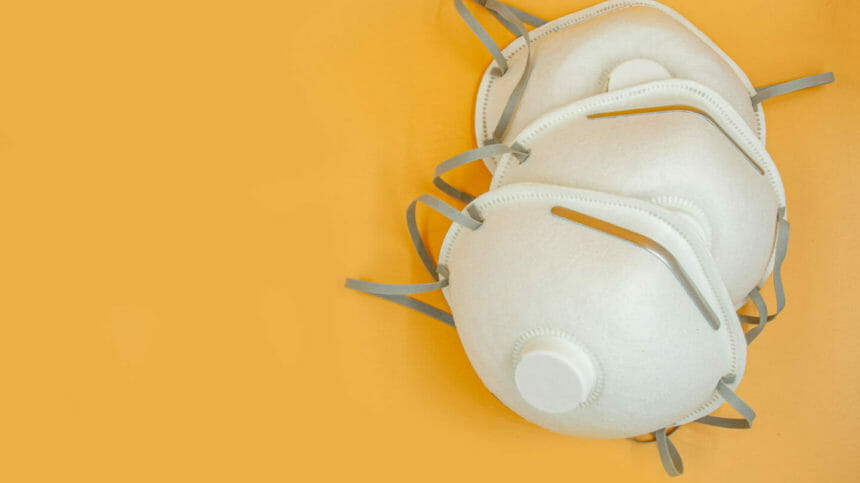
The federal government has issued guidance on the best ways to conserve personal protection equipment, such as gowns and facemasks, as supply shortages become a larger concern for providers and healthcare workers on the frontlines of the coronavirus outbreak.
The Centers for Disease Control and Prevention issued the expansive guidance Wednesday.
Regarding facemasks, the CDC recommends that providers implement extended use procedures, restrict facemask use to only healthcare works, implement limited re-use procedures and/or prioritize facemasks for selected activities.
For gowns, the guidance encourages providers to shift gown use toward cloth isolation gowns, consider using coveralls, implement extended use or re-use procedures and/or prioritize gowns.
The availability of PPE supplies has become a top concern for providers during the COVID-19 outbreak response, noted David Gifford, M.D., chief medical officer for the American Health Care Association/National Center for Assisted Living.
“This is a perfect storm,” Gifford said during a call Wednesday. “I hate to use that terminology, but that’s exactly what we’re seeing here.”
He explained that most of the manufacturing for personal protective equipment is done in China, and those factories have been shut down as that country has had to deal with the original source of the outbreak, which has since gone global. Gifford said that a “worldwide demand” on supplies, in conjunction with China’s decreased production, has fueled shortage concerns.
He cited an example of one provider having to use garbage bags to replace gowns, while some have been making their own masks.
AHCA/NCAL President and CEO Mark Parkinson said he was encouraged by Ohio’s state government encouraging dentists to share any extra PPE supplies with hospitals and nursing homes.
“What we need is creative solutions. We need people to responsibly conserve the equipment that they have, but we also need people that don’t need the equipment to give it up,” Parkinson said.
“We really encourage all the governors to think creatively about where there might be equipment in their state [and] who can they work with to make sure they get this equipment to the right place,” he added.
President Donald Trump also announced Wednesday plans to invoke the Defense Production Act, which would allow the federal government to force certain businesses to manufacture medical supplies in short supply to combat the coronavirus pandemic.
In other coronavirus-related news Wednesday:
• Speakers on the first day of 14th McKnight’s Online Expo on Wednesday offered insight about the growing effects of the COVID-19 outbreak:
Wound care suffering
“We can’t put our blinders on,” said Nancy Morgan of the Wound Care Education Institute. “[The pandemic] is forcing less frequency of dressing changes. They’re extending those out, and not changing as often, because they can’t come in contact with patients as often or the patients can’t come in.”
The biggest problem Morgan sees, however, is a shortage of personal protective equipment. “We’re hearing about it from everywhere — long-term care to pediatric hospitals. Everyone doesn’t have masks and other protective equipment.”
A shortage of qualified personnel also is expected to take a toll, she said: “It’s going to make things worse. We’ll have more infections that go crazy because they won’t be identified as quickly, and it probably will result in deaths. There won’t be enough people to change dressings and monitor how wounds are doing. I hope it doesn’t get too bad, but that’s what they’re experiencing right now.”
Cybersecurity ‘a heightened concern’
As if long-term care facilities don’t have enough on their plates, they need to keep the risk of cyberattacks front of mind during the coronavirus outbreak, experts said.
“Cybersecurity is a heightened concern right now,” Jennifer Griveas, chief human resources officer and general counsel for Eliza Jennings Senior Care Network, told listeners. “These are the times that cyberattacks ramp up and we are more vulnerable to them because our attention is elsewhere.”
She and colleague Michael M. Gray noted a hacking attempt took place just last weekend at the Department of Health and Human Services.
Many measures to prevent cyber breaches are inexpensive and can be implemented easily, the pair said. Among them:
- Have a secondary credentialing layer for email sign-ons
- Create a basic policy with user accounts and assign unique user IDs to every individual with access
- Restrict the ability to use removable drives
- Keep your personal and business lives separate in terms of accounts and passwords
- Know who has mobile devices and how they are being used
- Limit email rights
- Use VPN for remote users
‘Day jobs’ still important
While the industry is largely focused on coronavirus management, McKnight’s Online Expo kickoff speaker Leah Klusch told listeners to remain focused on their “day jobs.”
Operators are still fully responsible for accurate resident assessment and coding, she reminded during the session “PDPM: Improving competencies and care while reducing risks.”
• The CDC released an early report Wednesday regarding Washington state’s King County COVID-19 outbreak. The report found that limitations in effective infection control and prevention, and staff members who worked in multiple facilities contributed to the spread of the first COVID-19 outbreak in the U.S., which centered on nursing facilities.
• Finally, the creativity of loved ones figuring out how to buoy spirits of isolated elderly relatives has gained international attention many times over in recent days. One popular example is this British outlet’s coverage of a Massachusetts family’s extraordinary effort to celebrate Millie Erickson’s 100th birthday.





